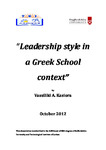Πλοήγηση ανά Θέμα "leadership"
Αποτελέσματα 1-15 από 15
-
Circular economy. The Greek industry leaders’ way towards a transformational shift
(2020)Circular Economy (CE) has caught the eye of scholars, practitioners and policy makers. Τhe discussion so far seems to touch mainly the meso and macro level, while investigations on implementation issues regard mainly ... -
Does it really take a village to raise a child? Reflections on the need for collective responsibility in inclusive education
(2022)Research in inclusive education reveals multiple studies that explore the efforts of individual stakeholders to create an equitable educational experience for students with disabilities. However, these individual efforts ... -
Enactment of compassionate leadership by nursing and midwifery managers: results from an international online survey
(2022)AIM: To explore the views of an international sample of nursing and midwifery managers concerning attributes that they associate with compassionate management. METHOD: A cross-sectional online survey. Using a snowballing ... -
Factorial Validity and Measurement Invariance of the Principal Leadership Questionnaire in Greek Educational Context
(2022)The purpose of this study was to investigate the applicability of the Principal Leadership Questionnaire (PLQ) to Greek educational context and to present the most important aspects describing educational leadership in a ... -
Implementing the European Sports Leadership Programme: A vehicle to help development graduate workplace competencies
(2020)This research was part of a large intervention study implementing the European Sports Leadership Programme (ESLP). This paper reports the outcomes of the qualitative study that employed focus groups to assess the students’ ... -
The Importance of Being a Compassionate Leader: The Views of Nursing and Midwifery Managers From Around the World
(2021)Introduction: Despite the importance of compassionate leadership in health care, many of the existing publications do not account for the effect of culture. The aim of this study is to explore the views of nursing and ... -
The Individual Rehabilitation Project as the core of person-centered rehabilitation: the Physical and Rehabilitation Medicine Section and Board of the European Union of Medical Specialists Framework for Rehabilitation in Europe
(2022)To facilitate the interaction between the health professional and the patient, a framework to guide the rehabilitation process is needed. This framework would encompass three interwoven aspects: the rehabilitation management ... -
Investigating Nursing Leadership in Intensive Care Units of Hospitals of Northern Greece and Its Relationship to the Working Environment
(2021)Introduction: The relationship between leadership and the work environment has been studied by many authors at the organization level, but not specifically in intensive care units (ICUs). The aim of this study was to ... -
Leadership style in a Greek school context
(2012)The main focus of this paper is the interest in principal leadership as a means to promote the improvement of teaching and learning procedures within Greek schools. This paper reports on an inquiry about school principal ... -
Leadership styles and leadership effectiveness in higher education
(2013)The aim of the current study was to determine the leadership style of heads of departments at Technological Educational Institution of Larissa and to explore the relationship between these leadership styles and the leadership ... -
Obstacles to compassion-giving among nursing and midwifery managers: an international study
(2020)Aim: To explore nursing and midwifery managers’ views regarding obstacles to compassion-giving across country cultures. Background: The benefit of compassionate leadership is being advocated, but despite the fact that ... -
Perceived verbal aggressiveness of coaches in volleyball and basketball: A preliminary study
(2006)This study examined verbal aggressiveness of coaches as perceived by their athletes, 108 senior athletes (57 boys and 51 girls) ages 15-19 years. Participants were basketball players (56 athletes) and Volleyball players ... -
Planning perspectives and approaches for activating underground built heritage
(2021)This paper delivers actionable recommendations towards building a rationale for activating and promoting Underground Built Heritage (UBH) based on the nexus heritage, territory and society, and making use of existing ... -
Student involvement in global veterinary education and curricula: 7 years of progress (2013-2019)
(2020)As central members of the veterinary education community, students are well placed to highlight current problems in veterinary education. Motivated by the lack of current formal student involvement, the largest global ... -
Women Pursuing a Neurosurgical Career in Greece
(2022)Traditionally, neurosurgery constitutes one of the most male-dominated scientific fields owing to several factors, including social stereotypes, nonequal opportunities for higher education, and historical circumstances. ...



